Pamela Hicks, the lady who danced with the Queen of England and meditated with Gandhi: ‘I am not a legend’
The British aristocrat, daughter of Louis Mountbatten and Edwina Ashley, may appear to have always lived in the shadow of her parents, of Queen Elizabeth II — whom she served as lady-in-waiting — or of her husband, the renowned decorator David Hicks. Nothing could be further from the truth. Now, her rich and varied life is told in a book by her daughter, India
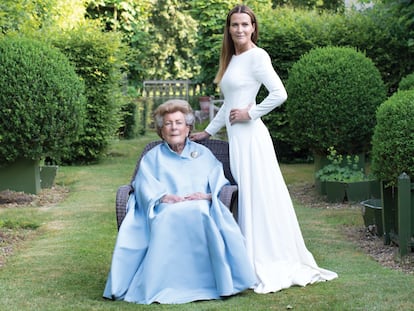
Few people can boast of having been born in the suite of a luxury hotel. Lady Pamela Carmen Louise Hicks, 96, is one of them. The English aristocrat entered the world on April 19, 1929, in a room of the old Ritz hotel in the Spanish city. Her mother, the wealthy heiress Edwina Ashley, went into labor during a vacation in Spain. Her father, Louis Mountbatten, related to almost all the European royal families, called the Royal Palace of Madrid to speak with his cousin, Queen Victoria Eugenie. Alfonso XIII answered the phone.
“I’m going to have a baby!” Lord Mountbatten exclaimed. The king, a notorious womanizer, misunderstood and replied: “Oh, dear Dickie. Don’t worry, I won’t tell anyone.” Mountbatten implored him: “Tell everyone. It’s my wife, Edwina, she’s having the baby.” Half an hour later, a doctor and several members of the royal guard were at the Ritz assisting them.
Such an unusual birth could only be the prelude to an exceptional life. Lady Pamela accompanied her parents to India when they were appointed viceroys. There, she met Gandhi and Jawaharlal Nehru and witnessed firsthand the beginning of the end of the British Empire. Later, she became a lady-in-waiting and confidante to the Queen of England, and finally, married David Hicks, the great decorator of Swinging London.
Now, her daughter, India Hicks, has published Lady Pamela: My Mother’s Extraordinary Years as Daughter to the Viceroy of India, Lady-in-Waiting to the Queen, and Wife of David Hicks, a book that reviews the astonishing biography of this figure — a living legend to royalty insiders, but largely unknown to the general public.
“Having lived a life in the shadow of her extraordinary parents, of Queen Elizabeth and of her husband, I felt it was time to dedicate a book to my mother’s rich and varied life, despite her protests,” explains India Hicks in a video call with EL PAÍS from The Grove, her mother’s Georgian-style home in the Oxfordshire countryside.
“I have never felt in anyone’s shadow. I have deliberately remained in their shadow,” Lady Pamela herself is quick to clarify, sitting very upright on one of the sofas in one of the small rooms of her mansion, surrounded by paintings and family photographs.
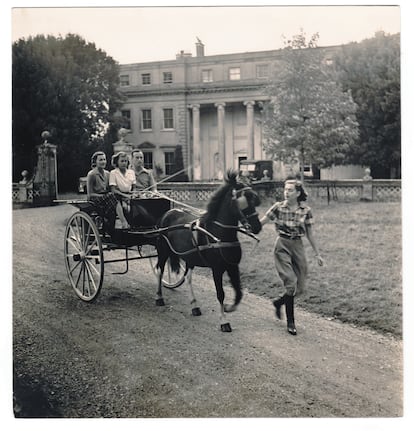
The nonagenarian aristocrat rarely gives interviews nowadays, but she makes an exception because it’s about the book her daughter dedicated to her. She enjoys robust health and an elephantine memory.
“Do you know that Alfonso XIII was my godfather at my christening? When the king was dethroned, he came to England to spend some time with my parents. Shortly after, my father was given a post in the Navy outside the United Kingdom and said to him: ‘Alfonso, I’m sorry, but I’m being sent abroad.’ The king replied: ‘When are we leaving?’ So he went with him.”
Lady Pamela recalls countless amusing anecdotes like this one. She says she was named Carmen in honor of her Spanish godmother, the Duchess of Peñaranda. She never met her but knows well that she scandalized the prudish Spain of the time with her romance with the bullfighter Cagancho. When asked if she still keeps in touch with the Bourbons, there is a long pause. Her daughter answers for her: “We see them from time to time at big family gatherings, like the funerals of Prince Philip or Queen Elizabeth.”
In 1940, at just 11 years old, the Mountbattens sent their daughter Pamela to the United States to protect her from the bombs of World War II. While Londoners endured the fury of the Nazi Blitz, she and her sister enjoyed the last glimmers of the Gilded Age in the New York mansion of millionaire Grace Vanderbilt.
Mrs. Vanderbilt, known as a social climber obsessed with European royalty, liked to boast that she knew everyone. “At one of their lunches, a gentleman left early because he had a play. ‘I’m going to see Hamlet,’ he announced. Mrs. Vanderbilt replied, ‘Oh, I know his father very well. Give him my love,’” Lady Pamela recalled during her conversation with EL PAÍS.
“On another occasion,” continued Lady Pamela, “she thought it would be good for our education to take us out of school to show us how she had set the table for a visit from Lord Halifax, the British Foreign Secretary. She took us out of class just for that. When my mother found out, she was furious.”
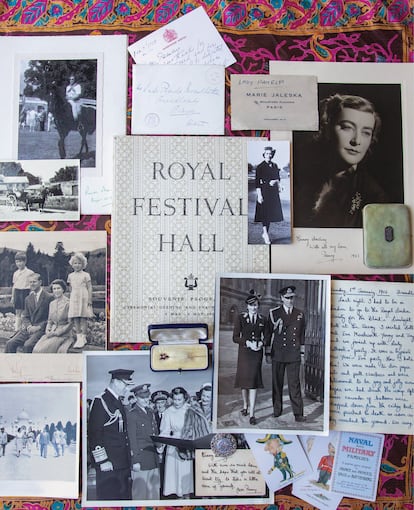
In 1941, Winston Churchill tasked Lord Mountbatten, Pamela’s father, with the initial planning of the Normandy landings, and in 1943 entrusted him with the Allied command in Southeast Asia. In 1947, after expelling the Japanese from Burma and Singapore, Mountbatten succeeded Lord Wavell as the last Viceroy of India to oversee the process of transferring power and granting independence to British India, along with its partition into the states of India and Pakistan.
At 17, Lady Pamela meditated with Mahatma Gandhi and affectionately called him Gandhiji. Her face lights up when she says his name. “I loved him. I loved Gandhi. Everyone loved him,” she says. “His mere presence was enough to stop a protest. He only owned one possession — a carving of the three wise monkeys. Did you know that? Poor thing, it was stolen from him on a train… the only thing he had.”
Pamela Hicks’ parents had an open marriage. Lord Mountbatten was involved with French socialite Yola Letellier, and Lady Mountbatten had an undefinable relationship with Jawaharlal Nehru, India’s first prime minister. According to Lady Pamela, her mother’s bond with Nehru was always platonic. “It was not a sexual relationship, but every bit as deep,” she told Vanity Fair in 2013. “My mother is very open-minded. Mom, aren’t you open-minded?” India asks. “About what?” the aristocrat replies. “About life.” “Of course!” she replies.
She was one of the first to know that Princess Elizabeth, the future Queen of England, was in love with her cousin, Philip Mountbatten. “She didn’t need to tell me anything. I knew her very well,” she says. Some courtiers disapproved of the match between a Windsor and a Greek prince with no throne, no kingdom, no money, and German ancestry. She, however, was delighted. It’s often said that the Queen’s motto was “Never complain, never explain.” Lady Pamela isn’t so sure. “Was it? I suppose…” So, what was Elizabeth II like? “She had a great sense of humor. She was very good at doing impressions. Being with her was always pleasant.”
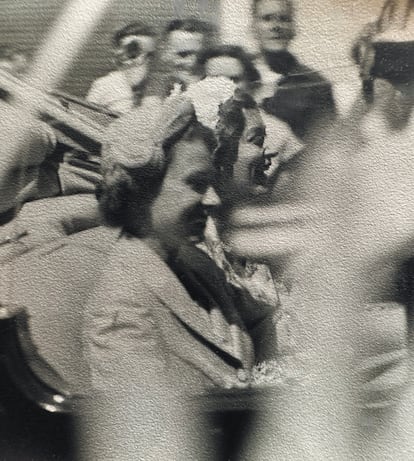
The Queen chose her as one of her bridesmaids for her wedding and later appointed her lady-in-waiting. After marrying the Duke of Edinburgh, she asked her to accompany them on a long tour of the Commonwealth countries. The aristocrat wasn’t thrilled about the idea, but eventually agreed. “My mother always says that service and duty come above all else. Those are two words you don’t hear much anymore,” notes India.
That trip, which was supposed to last six months, ended abruptly in Kenya on February 6, 1952. Lady Pamela was there when Elizabeth was informed of the death of her father, King George VI, at the age of 56. She hugged her, but immediately thought, “My God, she’s the Queen now!” Then she gave her a deep curtsy. “I remember she apologized to all of us for having to return early to England. That was just like her — always thinking of others first.”
She attended the monarch’s coronation at Westminster Abbey and witnessed the only moment that wasn’t televised — the anointing. They remained close until the end. Lady Pamela attended Queen Elizabeth II’s funeral in a wheelchair in September 2022.
“It was the end of an era, but with King Charles, a new one has begun,” she says. The aristocrat seems immovable, unshakable. She admits she never looks back. “I’ve learned to live one day at a time,” she says.
In 1979, her father was killed by the IRA. She says she forgave the Irish terrorist organization long ago. “Resilience — that’s what I admire most about my mother,” says India. “She comes from a family of enormous privilege, but that doesn’t mean she hasn’t faced tragedy and hardship. She’s overcome so much. She always says, ‘Face the sun and let the shadows fall behind you.’”
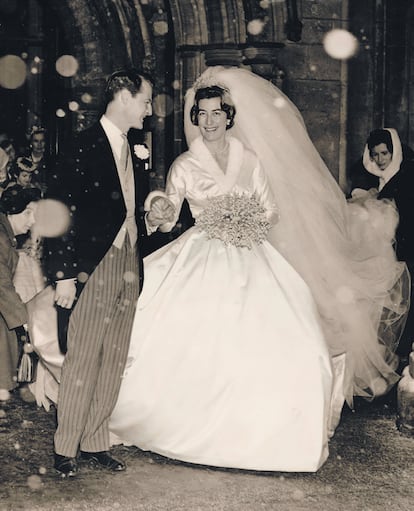
In January 1960, she married decorator David Hicks, a superstar of the Swinging Sixties. From the sitting room where she speaks with EL PAÍS — and where she spends her days reading — you can see the regal garden designed by her husband. Does the future of Europe worry her? “The world has always been unbalanced,” she replies. Does she feel nostalgia for the empire? “I don’t feel nostalgia for the past, I’m far too busy reading my books.”
When India Hicks is asked when she realized her mother was a legend, Lady Pamela answers before her daughter can: “I’m not a legend.” That’s what India admires most about her mother — her ability to downplay herself. “She’s always been very good at keeping our lives grounded. When it was announced that I was going to be a bridesmaid at Charles and Diana’s wedding, letters from all over the country and the world started arriving at our house. After the event, Mom said to me, ‘Now you have to go back to your normal life.’ She didn’t want me to feel special or different. She sent me straight back to boarding school.”
At nearly 97, Lady Pamela has witnessed much of the 20th century from the front row, and has known — and buried — some of its major figures. Does she feel like the last of her kind? “Mum, let me answer that,” India pleads. “She’s going to tell you no — but I think she is.”
Sign up for our weekly newsletter to get more English-language news coverage from EL PAÍS USA Edition
Tu suscripción se está usando en otro dispositivo
¿Quieres añadir otro usuario a tu suscripción?
Si continúas leyendo en este dispositivo, no se podrá leer en el otro.
FlechaTu suscripción se está usando en otro dispositivo y solo puedes acceder a EL PAÍS desde un dispositivo a la vez.
Si quieres compartir tu cuenta, cambia tu suscripción a la modalidad Premium, así podrás añadir otro usuario. Cada uno accederá con su propia cuenta de email, lo que os permitirá personalizar vuestra experiencia en EL PAÍS.
¿Tienes una suscripción de empresa? Accede aquí para contratar más cuentas.
En el caso de no saber quién está usando tu cuenta, te recomendamos cambiar tu contraseña aquí.
Si decides continuar compartiendo tu cuenta, este mensaje se mostrará en tu dispositivo y en el de la otra persona que está usando tu cuenta de forma indefinida, afectando a tu experiencia de lectura. Puedes consultar aquí los términos y condiciones de la suscripción digital.









































